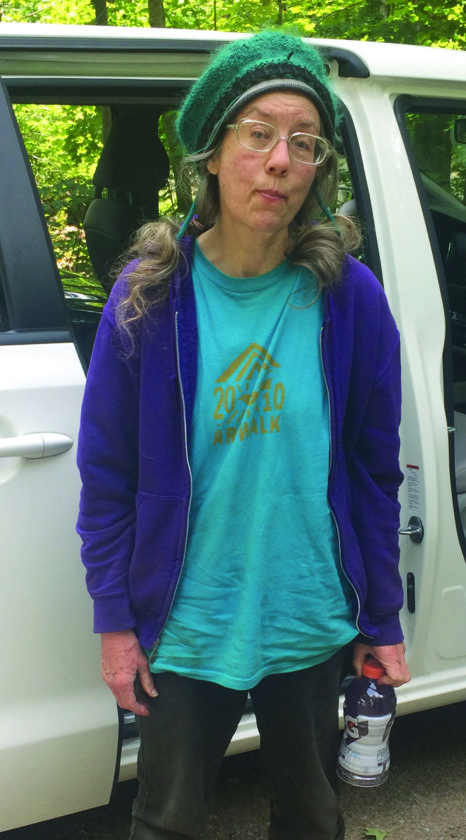Moore recalls little about how she survived

Missing hiker Kara Moore, 55, of Milwaukee waves to the hikers and park personnel who helped find her before boarding an ambulance to Munising Memorial Hospital for evaluation and treatment. (Photo courtesy of the National Park Service)
- Kara Moore is pictured. (Photo courtesy of the National Park Service)
- Missing hiker Kara Moore, 55, of Milwaukee waves to the hikers and park personnel who helped find her before boarding an ambulance to Munising Memorial Hospital for evaluation and treatment. (Photo courtesy of the National Park Service)
Kara Moore, of Milwaukee, reportedly doesn’t remember very much, due to a traumatic brain injury suffered as a teenager that disabled her short-term memory, said Susan Reece, chief of interpretation and education at Pictured Rocks National Lakeshore.
This has been an unusual case, Reece said.
“It’s mainly because of who she was, that’s what makes it a lot harder to figure out,” Reece said. “We really don’t think we’ll ever know. When someone doesn’t have the short-term memory, nothing’s sticking in their head, so yeah, that’s the hard part of it.”
Moore remembered sleeping by a log and drinking water from a creek, Reece said. But what she ate and where she was?

Kara Moore is pictured. (Photo courtesy of the National Park Service)
“She doesn’t remember. She thinks she was missing for a day. She just doesn’t have the memory,” Reece said.
Hikers from Georgia first spotted Moore walking toward them Wednesday at about 1:30 p.m. on the Beaver Lake Trail, and they recognized her from postings and descriptions, Reece said. They confirmed her name, told her a lot of people were looking for her and brought her back to the trailhead, where they gave her water and a sandwich and waved down a park service vehicle.
Moore didn’t seem afraid and appeared to be in good shape, Reece said.
She was taken by ambulance to Munising Memorial Hospital where her family met her. There she was treated for dehydration and muscle fatigue and kept overnight for observation, according to a press release from the National Park Service.
Reece said Moore remembers waking up, not seeing her family and hiking back down the trail.
“She may not have even realized they were looking for her, even if she heard her name,” Reece said. “We’re not sure if she had any food in her backpack. … She was hungry when she came out, … a little dehydrated, … but she actually looked really good.”
Five days is an extremely long time to be lost in the wilderness, Reece said, even 72 hours is “pushing it.” But if a person has food, water and adequate clothing to deal with temperature changes — which got as low as 40 degrees and as high as 80 degrees in that area, Reece said — that’s critical.
Reece said Moore did have an additional flannel shirt in her backpack.
“People are kind of like ‘how can this be?'” Reece said. “We just don’t know, luck, whatever. She’s very lucky. … But she’s, in a way, blissfully oblivious, so it’s kind of good for her.”
Moore went missing the evening of July 14 in the Beaver Creek Wilderness area of the park. She was last seen by her family on the Lake Superior beach preparing to take the 1.5 mile trail back to the trailhead parking lot near Beaver Lake Campground, according to the press release.
When the family got back to the trailhead, they noticed that Moore was not with them. They went back to look for her, and when they couldn’t find her, they called for help. Rangers received the report at 7:50 pm and at 8:30 pm, the park started searching area trails by foot and the Lake Superior shoreline by boat.
Over the next few days, the search expanded to include staff from multiple agencies: Michigan State Police canine and helicopter teams, Michigan Department of Natural Resources Conservation Officers, US Forest Service officers, Alger County Sheriff’s Deputies, a Tactical Tracking team from Keweenaw Bay Tribal Police, and a private search and investigation team, Michigan Backcountry Search & Rescue.
At the peak of the operation, there were more than 30 searchers involved, according to the press release. Searchers covered roads, trails, off-trail areas, inland lakes by canoe and Lake Superior by motorboat, but no signs of Moore were found. Missing person signs were put up throughout the park and on social media.
Reece said the family is very grateful for all the people and agencies who assisted, and for the quick search response. They are also thankful for the emotional support offered to the family and the sensitivity in handling the incident, according to the release.
Mary Wardell can be reached at 906-228-2500, ext. 248. Her email address is mwardell@miningjournal.net.






